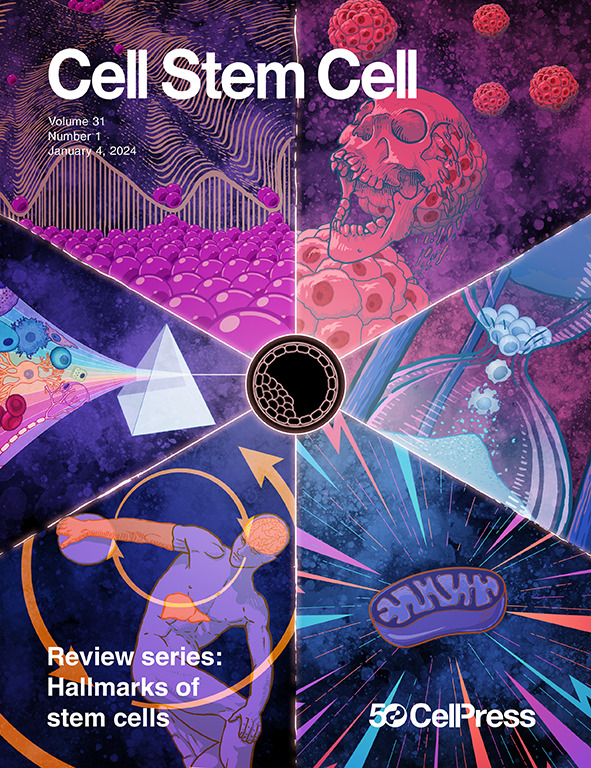DNMT3A在造血干细胞中的非规范功能调节端粒酶活性和基因组完整性
IF 20.4
1区 医学
Q1 CELL & TISSUE ENGINEERING
引用次数: 0
摘要
DNMT3A是造血干细胞(HSC)命运决定的关键调节因子,也是人类克隆造血(CH)中最常发生突变的基因。DNMT3A被描述为一种DNA甲基转移酶,但DNMT3A功能丧失的细胞显示出DNA甲基化的微小变化,这与基因表达的改变无关。为了探索Dnmt3a在造血干细胞中具有dna甲基化无关功能的可能性,我们创建了一系列具有不同水平dna甲基化受损Dnmt3a的等位基因小鼠。缺乏DNA甲基化能力的Dnmt3a蛋白挽救了缺乏Dnmt3a的造血干细胞的克隆扩增,这表明Dnmt3a在造血干细胞中具有重要的非规范功能。Dnmt3a-null的造血干细胞可以无限期移植,这意味着能够绕过限制造血干细胞复制寿命的机制,如端粒缩短。DNMT3A缺失的HSC显示端粒酶活性增加,并在连续移植中维持端粒长度,揭示了DNMT3A突变在调节HSC寿命中先前未被发现的与DNA甲基化功能无关的作用。本文章由计算机程序翻译,如有差异,请以英文原文为准。

Non-canonical functions of DNMT3A in hematopoietic stem cells regulate telomerase activity and genome integrity
DNMT3A is a critical regulator of hematopoietic stem cell (HSC) fate decisions and the most recurrently mutated gene in human clonal hematopoiesis (CH). DNMT3A is described as a DNA methyltransferase enzyme, but cells with DNMT3A loss of function show minor changes in DNA methylation that do not correlate with altered gene expression. To explore the possibility that Dnmt3a has DNA-methylation-independent functions in HSCs, we created an allelic series of mice with varying levels of DNA-methylation-impaired Dnmt3a. Clonal expansion of Dnmt3a-deficient HSCs was rescued by Dnmt3a proteins lacking DNA methylation capacity, suggesting that Dnmt3a has important non-canonical functions in HSCs. Dnmt3a-null HSCs can be transplanted indefinitely, implying the ability to circumvent mechanisms that limit the replicative lifespan of HSCs, such as telomere shortening. Dnmt3a-null HSCs show increased telomerase activity and sustain telomere length over serial transplantation, revealing a previously unidentified role for DNMT3A mutations in regulating HSC longevity that is unrelated to DNA methylation function.
求助全文
通过发布文献求助,成功后即可免费获取论文全文。
去求助
来源期刊

Cell stem cell
生物-细胞生物学
CiteScore
37.10
自引率
2.50%
发文量
151
审稿时长
42 days
期刊介绍:
Cell Stem Cell is a comprehensive journal covering the entire spectrum of stem cell biology. It encompasses various topics, including embryonic stem cells, pluripotency, germline stem cells, tissue-specific stem cells, differentiation, epigenetics, genomics, cancer stem cells, stem cell niches, disease models, nuclear transfer technology, bioengineering, drug discovery, in vivo imaging, therapeutic applications, regenerative medicine, clinical insights, research policies, ethical considerations, and technical innovations. The journal welcomes studies from any model system providing insights into stem cell biology, with a focus on human stem cells. It publishes research reports of significant importance, along with review and analysis articles covering diverse aspects of stem cell research.
 求助内容:
求助内容: 应助结果提醒方式:
应助结果提醒方式:


